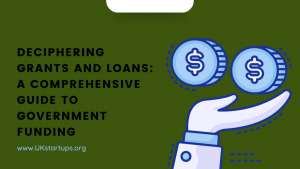Funding Granted to Local Entrepreneurs
Category: Blog
In the ever-evolving landscape of local entrepreneurship, securing appropriate funding stands as a critical pillar for success. This article offers a deep dive into the world of granted funding, a key resource for many small and medium-sized enterprises. Here, we’ll explore various avenues for securing such funding, strategies to enhance your application’s success rate, and best practices for managing these funds to drive business growth.
Understanding Granted Funding
Defining Granted Funding: Granted funding is essentially financial assistance provided to businesses without the obligation of repayment. This funding can take various forms, such as cash awards, resources, or services, and is often aimed at fostering innovation, supporting local economies, or promoting social causes.
The Importance for Local Entrepreneurs: For local business owners, these funds can be a game-changer, enabling them to scale up operations, invest in new technology, or expand their workforce. It’s a pathway to turning business ideas into reality without the burden of debt or equity loss.
Identifying Funding Sources
Government Grants: Governments frequently offer financial support to stimulate local economic growth, support innovative projects, or encourage entrepreneurship in specific industries. These grants might target various stages of business development, from start-ups to expansion efforts.
Private Sector Grants: Corporations and private businesses often provide grants as part of their commitment to corporate social responsibility or to foster innovation in industries they are involved in. These can be particularly beneficial for entrepreneurs seeking industry-specific expertise and support.
Non-Profit and Community-Based Grants: Non-profits and community organisations offer grants to businesses that align with their mission, such as community development, environmental sustainability, or social welfare. These grants can also offer networking and mentorship opportunities.
Eligibility and Application Process
Understanding Eligibility Criteria: Each funding body sets specific eligibility criteria, which could include the size and type of business, the project’s scope, and its potential impact. It’s important to thoroughly understand these requirements to increase your chances of success.
Navigating the Application Process: This process can be daunting, with requirements for detailed business plans, budget forecasts, and project outlines. A meticulous, well-prepared application is key to standing out in a competitive field.
Crafting a Winning Proposal
Highlighting Your Business Plan: A compelling business plan should articulate your vision, market research, competitive analysis, and a detailed plan for the use of funds. It should also reflect your passion and commitment to the business’s success.
Demonstrating Impact: Grant providers often look for projects that will have a significant impact – be it economic, social, or environmental. Show how your business will contribute to the local community, create jobs, or innovate within your industry.
Leveraging Local Networks
Building Relationships: Networking with local entrepreneurs, attending industry events, and joining business groups can provide insights into grant opportunities and valuable advice on application strategies.
Collaboration Opportunities: Partnering with other businesses or academic institutions for grant applications can strengthen your proposal and demonstrate community and industry integration.
Utilising Digital Platforms for Funding Opportunities
Online Grant Portals: Platforms like Grants.gov or local equivalent sites are excellent resources for finding available grants, with tools to filter searches based on your business’s characteristics and needs.
Social Media for Awareness: Utilising social media to follow industry leaders, funding bodies, and entrepreneurial networks can provide real-time updates on new funding opportunities and application tips.
Financial Management and Planning
Effective Use of Funds: Once you’ve secured funding, it’s imperative to adhere to a strict budget and funding agreement. This means using the funds for their intended purpose and keeping meticulous records.
Planning for Long-Term Sustainability: Grants are typically one-time funding sources. Therefore, it’s important to have a long-term financial plan that includes diversifying income streams and reinvesting profits for sustainable growth.
Legal and Ethical Considerations
Understanding the Legal Obligations: Grants come with legal obligations, such as how the money can be spent, reporting requirements, and sometimes audits. Familiarise yourself with these to avoid legal complications.
Maintaining Transparency and Integrity: Honesty and integrity in your application and in the use of funds are paramount. This not only fulfils ethical standards but also builds your reputation in the business community.
Measuring and Reporting Success
Setting Metrics for Success: Define clear, measurable objectives to evaluate the impact of the grant on your business. This could include sales growth, market expansion, or product development milestones.
Regular Reporting and Communication: Keeping the grant provider updated with regular reports and open communication fosters trust and could lead to further funding opportunities or partnerships.
Overcoming Common Challenges
Dealing with Rejection: It’s common to face rejections. Each rejection is an opportunity to refine your approach. Seek feedback, make adjustments, and persist in your efforts.
Staying Informed and Adaptable: The funding landscape is dynamic. Staying informed about trends, policy changes, and new opportunities is key to adapting your strategies and remaining competitive.
EECW.CO
Background: Emma Johnson, a passionate environmental advocate from Brighton, UK, dreamt of starting her own business focused on sustainable fashion. With a background in textile design and a deep commitment to eco-friendly practices, Emma envisioned creating a line of clothing made entirely from recycled materials. However, the initial financial investment required to launch her idea was a significant hurdle.
The Grant Opportunity: In 2022, Emma discovered the “Green Business Grant” offered by her local council, aimed at supporting environmentally sustainable business initiatives. This grant provided funding for entrepreneurs who demonstrated a commitment to eco-friendly practices and sustainable community impact.
Application and Approval: Emma applied for the grant through UKStartups, detailing her business plan, which included sourcing materials from local recycling centres, employing eco-friendly manufacturing processes, and creating a line of stylish yet sustainable clothing. Her application highlighted how her business would contribute to the local economy and promote environmental sustainability. Impressed by her innovative approach and clear vision, the grant committee approved her application, awarding her £20,000 to kickstart her business.
Launching the Business: With the grant money, Emma set up her workshop in Brighton, investing in essential equipment and hiring two local artisans skilled in eco-friendly textile practices. She branded her business as “EcoWeave,” focusing on creating high-quality, fashionable garments that were 100% sustainable.
Growth and Impact: EcoWeave quickly gained popularity, initially through local markets and eco-fairs, and then expanding to an online store. The brand resonated with consumers passionate about environmental issues, drawing attention for its innovative use of recycled materials and commitment to sustainability.
Emma’s venture also created job opportunities in the local community, especially for young people interested in sustainable fashion. She offered workshops on sustainable practices, further embedding her business within the community.
Recognition and Expansion: Within two years, EcoWeave’s success caught the attention of larger retail chains, leading to partnerships that expanded the brand’s reach across the UK. Emma reinvested a significant portion of the profits into further sustainable innovations, staying true to her eco-friendly ethos.
Reflections: Reflecting on her journey, Emma credits the Green Business Grant as a turning point. “The grant not only provided the financial resources I needed,” she says, “but also validated my idea and gave me the confidence to pursue my dream. It’s amazing to see how an idea can blossom into something that positively impacts both the community and the environment.”
Granted funding can be a powerful catalyst for local entrepreneurs, offering financial support without the constraints of debt or equity financing. By understanding the landscape, crafting strong applications, and managing funds responsibly, entrepreneurs can leverage these opportunities to drive their businesses forward.
Frequently Asked Questions (FAQs)
1. How can I find out about grant opportunities for my business? Regularly check government and private funding websites, subscribe to newsletters, and engage in local business networks to stay informed about new grant opportunities.
2. What makes a grant proposal stand out? A standout proposal clearly articulates how the grant will impact the business and the community, backed by a solid business plan, thorough research, and a passionate presentation.
3. Are there grants available for all types of businesses? Grants are available for a wide range of businesses, but their focus may vary based on industry, business size, and the purpose of the funding. Thorough research is necessary to find the right fit.
4. How should I manage the funds if I receive a grant? Develop a detailed budget and adhere strictly to it. Ensure all spending aligns with the grant’s objectives and maintain transparent financial records.
5. Can receiving a grant affect my business’s financial stability? While grants provide a financial boost, it’s essential to plan for sustainable growth and not rely solely on grant funding for long-term business stability. Diversify your revenue streams and reinvest profits wisely.





